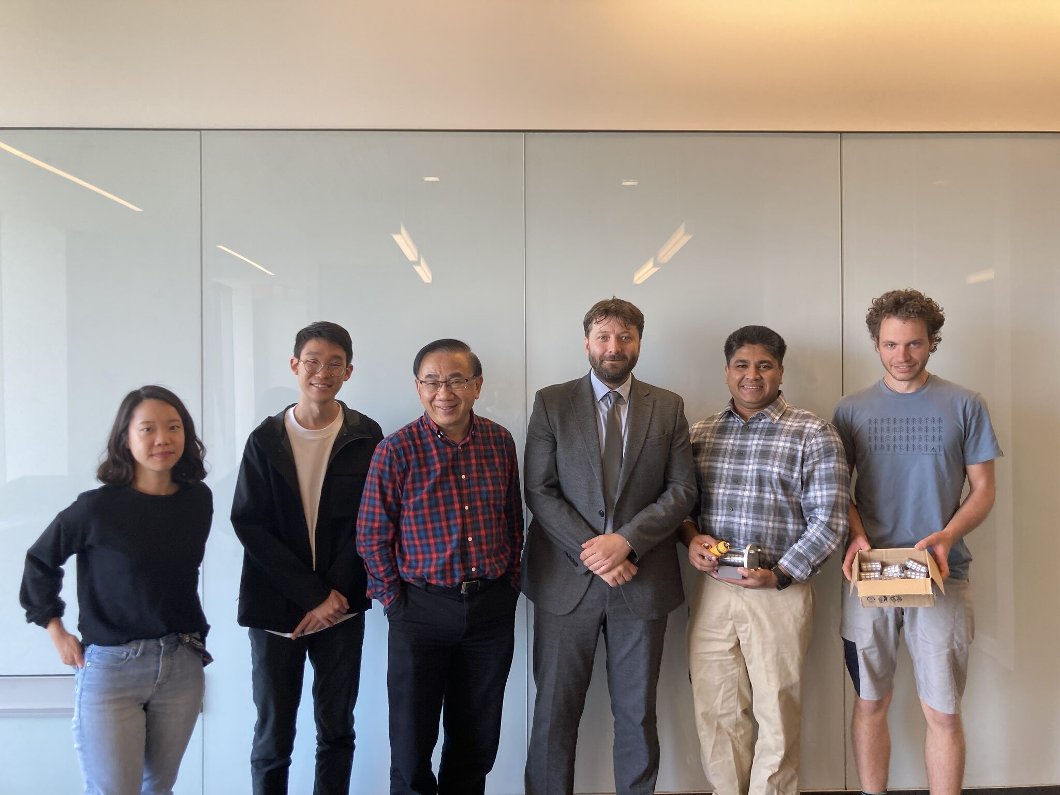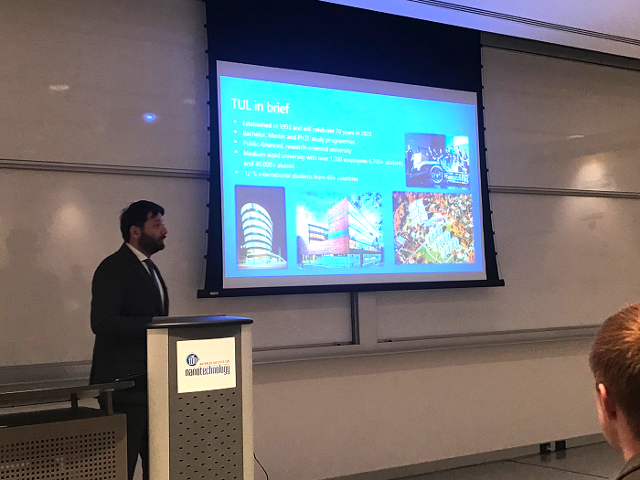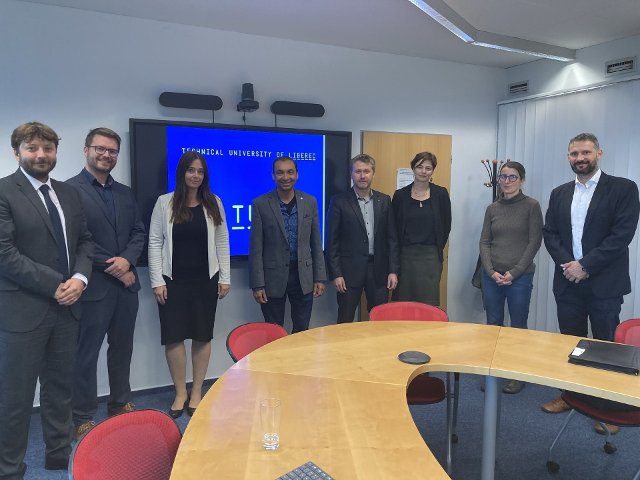
WIN Partnership with the Technical University of Liberec, Czech Republic: Memorandum of Understanding signed in January 2024
26.02.2024 / 23:43 | Aktualizováno: 27.02.2024 / 00:02
On 18th January 2024, a Memorandum of Understanding (MOU) was signed between the Technical University of Liberec (TUL) in the Czech Republic and the University of Waterloo (UWaterloo) through the Department of Chemical Engineering and the Waterloo Institute for Nanotechnology (WIN).
(Adopted from the Waterloo Institute for Nanotechnology press release)
The WIN-TUL partnership was facilitated in 2022 by the Consulate General of the Czech Republic to Toronto under the leadership of WIN Executive Director, Sushanta Mitra, who visited the Czech Republic and TUL, organized by the agency CzechInvest and the Consulate. During this time, the synergy between TUL and WIN in sustainable nanomaterials development became apparent, with both institutions boasting strong research and education programs in this area and excellent complementary expertise in nanotechnology and facilities.
Initial steps in the partnership were spearheaded by WIN Core member Michael Tam in Chemical Engineering at UWaterloo and Jan Valtera, Professor in the Department of Textile Machine Design at TUL. Their collaboration combined UWaterloo's expertise in sustainable nanomaterials and TUL's proficiency in nanofiber production. The partnership took a significant step forward with a research visit to UWaterloo by Valtera under the WIN Visiting Scholar Program and his PhD student in June 2023 which laid the foundation for ongoing cooperation, marked by monthly Zoom meetings involving eight to ten participants from both institutions.
Professor Valtera is very enthusiastic about the partnership. "The collaboration is based on the expertise of both sides. WIN's input lies in the preparation of functionalized nanocellulose for technical as well as medical purposes, while TUL focuses on the preparation of polymeric solutions and the production of nanofiber materials with these functionalized additives using the highly effective method of preparation polymeric nanofibers."
The recently established MOU outlines ambitious goals for the partnership. Primarily, the focus is on training graduate and co-op students, as well as developing new knowledge and technology for producing CNC-polymer nanofibers designed for air and water purification. Tam envisions the potential for new innovations, with the possibility of startup ventures emerging from this collaboration.
The MOU not only sets the stage for the accomplishment of these goals but also paves the way for future partnerships and initiatives. The expertise outlined in the MOU, particularly in electrospinning, opens doors for broader collaboration. Valtera's visit to various research centers at UWaterloo, such as WISE and RoboHub, signaled an eagerness to expand the collaboration beyond nanomaterials.
Mobility of students and researchers will remain another important element in the partnership, making use particularly of the Erasmus Mobility Program funded by the European Union. This partnership will continue to explore other funding programs such as NSERC Alliance International, MITACS and other Canadian sources. Importantly, the recent association of Canada to the Horizon Europe program can allow robust research consortia to form. The link between Waterloo and Liberec can therefore open doors to even broader collaboration with European prominent researchers and access to significant funding.
Looking ahead, the potential for expanding the collaboration is evident. Valtera, in his role as Vice Dean International, expresses a desire to broaden the partnership to encompass additional research activities. Currently, Professors Michael Tam and Milad Kamkar from WIN are working with Professors David Lukáš, Petr Mikeš, Petr Žabka and Jan Valtera from TUL, with approximately 10 PhD students in total from both sides working on collaborative research. The newly signed MOU will help expand the partnership even further, and open up the possibility of joint-PhD programs in the future.
In summarizing the potential of this partnership, Tam emphasizes, "This collaboration will enable the processing of sustainable nanomaterials using the electrospinning technology from TUL that will accelerate innovations for air and water purification. We will train HQPs and develop technology that contributes to the new zero carbon economy, and secure air and water resources for humanity."
Samples for joint research have indeed already been exchanged and TUL has manufactured a device for candle filter testing, that is just being shipped to Canada.
WIN Executive Director Sushanta Mitra is well-versed in the significance of partnerships within the EU, and within the strong and expanding economies in Central Europe. He has been working to forge new collaboration in this region for many years, and sees the Czech Republic as an important strategic international partner for UWaterloo. Increasingly, the Czech Republic is earning an excellent reputation as an engineering and manufacturing powerhouse – its has a rich history of scientific and technological achievement (including the invention of the soft contact lens and the production of about one third of world’s electron microscopes) and their education system considered one of the best in the world.
Reflecting on his initial visit to TUL that catalyzed this partnership with Tam and others at Waterloo, Mitra mentioned: "In today’s highly polarized and fragmented world, it is important that institutes, like WIN, look beyond its traditional partner countries in Europe and seek for new opportunities in Central Europe, particularly in Czech Republic, where we see multiple potentials for engagement to further accelerate our innovation pipeline. Such internationalization strategy will provide our WIN members and researchers opportunities to access specialized laboratories, quality students, connecting with local industries, and access to a broader European market for our start-ups, which wouldn’t have been possible earlier."
TUL is considered one of the best technical universities in the EU, and shares a similar technical and industrial focus to that of Waterloo. Founded in 1953, TUL recently celebrated its 70th anniversary. Located in northern Bohemia in the Czech Republic, TUL offers technical education for about 6,000 students in a variety of areas from mechanical engineering to business. Championing robust applied research, the university has been able to build on the long history of textile production in the region, resulting in world-class research in nanofibers. In particular, the university originated the first industrial level solution for nanofiber spinning provided by the spin-off company Elmarco. TUL also collaborates with about 200 industrial partners and offers state-of-the-art laboratories, with the new top-notch Institute for Nanomaterials, Advanced Technology and Innovation built ten years ago.
This MOU signifies a very important step towards expanding WIN’s international partnerships in driving innovation, fostering academic excellence, and addressing global challenges.






